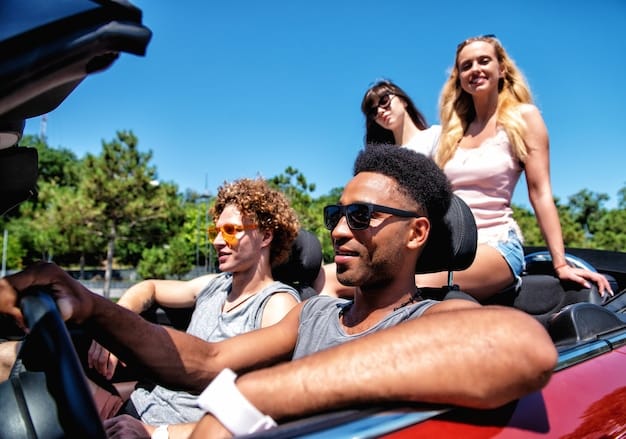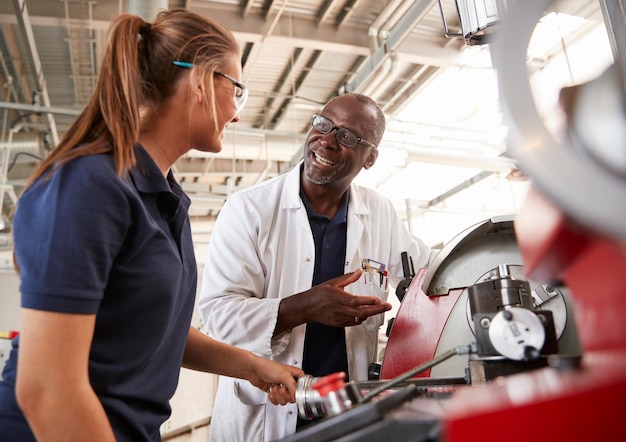Car Club Culture: Building Community and Passion in the Digital Age

Car club culture thrives by fostering community and shared passion among automotive enthusiasts in the digital age, connecting individuals through online platforms and real-world events.
The car club culture: building community and sharing passion in the digital age, is more impactful than ever, uniting enthusiasts through shared interests, events, and online interactions.
Understanding the Essence of Car Club Culture
Car club culture represents more than just a gathering of vehicles; it’s a vibrant community built on a mutual love for automobiles. These clubs bring together people from all walks of life, connected by their enthusiasm for cars, whether classic, modern, or custom-built.
The essence of a car club extends beyond casual meetups, fostering lasting friendships, knowledge sharing, and a sense of belonging. Members often collaborate on projects, offer support during maintenance or restoration, and celebrate each other’s automotive achievements.
Historical Roots of Car Clubs
The origins of car clubs can be traced back to the early days of motoring when enthusiasts began forming groups to share their experiences, knowledge, and passion for these new machines. These early clubs were often exclusive, catering to wealthy owners of luxury vehicles.
Evolution into Modern Communities
Today’s car clubs are more inclusive and diverse, welcoming enthusiasts from all backgrounds and with a wide range of automotive interests. The rise of the internet and social media has further transformed car club culture, enabling global connections and instant information sharing.
- Early Beginnings: Car clubs emerged in the early 20th century, uniting pioneering motorists.
- Community Growth: These clubs evolved into supportive networks for sharing knowledge and experiences.
- Digital Transformation: The internet has expanded car club reach globally, fostering broader communities.
- Inclusivity Boom: Modern car clubs embrace diverse interests and backgrounds, promoting inclusivity.
In conclusion, car club culture has deep roots and has evolved significantly, embracing technology and diversity to create vibrant communities centered around a shared passion for cars.
The Role of Digital Platforms in Modern Car Clubs
Digital platforms have revolutionized the way car clubs operate, providing new avenues for communication, organization, and community building. These tools enable enthusiasts to connect across geographical boundaries, share their projects, and coordinate events with ease.
From social media groups to dedicated forums and specialized apps, digital platforms have become essential for car clubs to thrive in the modern era, enhancing engagement and fostering a sense of global community.

Social Media Engagement
Platforms like Facebook, Instagram, and Twitter have become indispensable for car clubs, offering opportunities to showcase their activities, attract new members, and engage with a wider audience. Through these channels, clubs can share photos, videos, and updates, creating a dynamic and interactive online presence.
Dedicated Online Forums
Online forums provide a space for car club members to engage in in-depth discussions, ask questions, and share technical knowledge. These forums often feature dedicated sections for specific car models, projects, and events, fostering a sense of expertise and collaboration.
- Enhanced Communication: Digital platforms enable instant communication among car club members.
- Global Reach: Clubs can connect with enthusiasts worldwide, expanding their networks.
- Event Coordination: Online tools simplify the planning and management of car club events.
- Knowledge Sharing: Digital platforms facilitate the exchange of technical expertise and project ideas.
In summary, digital platforms play a critical role in modern car clubs, enhancing communication, expanding reach, simplifying event coordination, and fostering a stronger sense of community among enthusiasts.
Organizing Events and Meetups in the Digital Age
Organizing events and meetups has become more streamlined thanks to digital tools that facilitate planning, promotion, and participant engagement. Car clubs now leverage online platforms to manage registrations, communicate updates, and gather feedback, ensuring successful and well-attended events.
Digital solutions also enable clubs to reach a wider audience, attracting new members and sponsors while providing a seamless experience for participants, from online registration to post-event surveys.
Online Registration and Ticketing
Online registration platforms simplify the process of signing up for car club events, allowing members to register and pay fees through a user-friendly interface. These platforms also provide clubs with valuable data on attendance, demographics, and preferences, helping them tailor future events to better meet the needs of their audience.
Digital Promotion and Marketing
Digital marketing strategies, including social media campaigns, email newsletters, and targeted advertising, enable car clubs to promote their events to a wider audience and attract new participants. These tools help clubs create buzz, generate interest, and drive attendance, maximizing the impact of their events.
- Streamlined Planning: Digital tools simplify event logistics and coordination.
- Wider Reach: Online promotion attracts a broader audience and new members.
- Enhanced Engagement: Digital platforms facilitate interaction and feedback from participants.
- Data-Driven Insights: Online registration provides valuable data for improving future events.
To conclude, organizing events in the digital age offers numerous advantages for car clubs, from streamlined planning and wider promotion to enhanced engagement and data-driven insights, contributing to more successful and impactful gatherings.
Building and Maintaining a Strong Car Club Community
Building and maintaining a vibrant car club community requires fostering a sense of belonging, encouraging active participation, and addressing conflicts constructively. Strong communities provide value to their members beyond just a shared interest in cars, offering friendship, support, and opportunities for personal growth.
By prioritizing inclusivity, communication, and member recognition, car clubs can create environments where enthusiasts feel valued, connected, and motivated to contribute to the collective success.

Fostering Inclusivity and Diversity
Creating an inclusive environment is essential for attracting and retaining members from diverse backgrounds and with varied automotive interests. Car clubs should actively promote inclusivity by welcoming new members, celebrating different perspectives, and ensuring that all voices are heard and respected.
Encouraging Active Participation
Active participation is the lifeblood of a strong car club community. Clubs should encourage members to contribute their time, talents, and ideas through volunteering, organizing events, and sharing their knowledge. Recognizing and celebrating members’ contributions can further motivate participation and engagement.
- Sense of Belonging: Fostering a welcoming and supportive environment for all members.
- Open Communication: Encouraging dialogue, feedback, and constructive criticism.
- Member Recognition: Acknowledging and celebrating the contributions of individuals.
- Conflict Resolution: Addressing disputes fairly and constructively to maintain harmony.
In summary, building a strong car club community involves fostering inclusivity, encouraging active participation, and prioritizing communication, ensuring a vibrant and supportive environment for all members.
The Economic and Social Impact of Car Clubs
Car clubs have a significant economic and social impact, contributing to local economies through events, tourism, and automotive-related spending. They also enhance social connections, promote community involvement, and preserve automotive heritage.
By supporting local businesses, organizing charitable events, and promoting responsible driving, car clubs play a positive role in their communities, fostering economic growth and social well-being.
Supporting Local Economies
Car clubs contribute to local economies by hosting events that attract tourists, generate revenue for local businesses, and stimulate automotive-related spending. These events can range from car shows and rallies to auctions and swap meets, providing a boost to the hospitality, retail, and automotive sectors.
Preserving Automotive Heritage
Car clubs play a vital role in preserving automotive heritage by restoring, maintaining, and showcasing classic and vintage vehicles. These clubs often organize educational programs, workshops, and museum exhibits to share their knowledge and passion with the public, ensuring that automotive history is appreciated and preserved for future generations.
- Economic Stimulation: Car clubs boost local economies through events and spending.
- Community Engagement: Car clubs promote involvement and support for local initiatives.
- Heritage Preservation: Car clubs help preserve automotive history and traditions.
- Social Connections: Car clubs foster friendships and a sense of belonging among members.
In conclusion, car clubs have a multifaceted impact, contributing to economic growth, social cohesion, and the preservation of automotive heritage, making them valuable assets to their communities.
Future Trends in Car Club Culture
The future of car club culture is likely to be shaped by emerging technologies, evolving automotive trends, and changing demographics. Electric vehicles, autonomous driving, and virtual reality are poised to transform the way enthusiasts interact with cars and with each other.
Car clubs that embrace these changes and adapt to the needs of new generations of enthusiasts will be best positioned to thrive in the years ahead, continuing to foster community and passion in the digital age.
Electric Vehicle (EV) Clubs
As electric vehicles become more mainstream, dedicated EV clubs are emerging to cater to enthusiasts interested in exploring the performance, technology, and sustainability of electric cars. These clubs offer opportunities for EV owners to share their experiences, learn about charging infrastructure, and advocate for the adoption of electric mobility.
Virtual Reality (VR) and Simulated Racing
Virtual reality and simulated racing are creating new ways for car enthusiasts to engage with their passion, offering immersive experiences that replicate the thrill of driving on iconic race tracks or exploring exotic virtual landscapes. VR and simulated racing can also enhance driver training and education, providing a safe and cost-effective way to improve skills.
- EV Integration: Car clubs will increasingly incorporate electric vehicles and related technologies.
- VR Experiences: Virtual reality will offer immersive and interactive automotive experiences.
- Autonomous Vehicles: Car clubs may explore the implications and possibilities of self-driving cars.
- Diverse Formats: Car club meetings may evolve to include digital and hybrid formats for wider participation.
| Key Point | Brief Description |
|---|---|
| 🚗 Community Building | Car clubs foster a sense of belonging among automotive enthusiasts. |
| 🌐 Digital Integration | Online platforms enhance communication and event organization. |
| 🛠️ Shared Passion | Members collaborate on projects and share automotive knowledge. |
| 🌱 Economic and Social Impact | Car clubs contribute to local economies and preserve automotive heritage. |
FAQ
▼
Car club culture encompasses the community, activities, and shared enthusiasm among individuals who come together due to a mutual interest in automobiles. It involves various events, shared knowledge, and social interactions.
▼
Digital platforms have expanded car clubs’ reach, improved communication, and streamlined event organization. Social media, forums, and specialized apps allow members to connect globally and stay informed about club activities.
▼
Joining a car club offers opportunities for social interaction, knowledge sharing, and access to exclusive events and resources. Members can also benefit from collaborative projects and the collective expertise of the community.
▼
Car clubs contribute by supporting local businesses through events, organizing charitable activities, and promoting responsible driving practices. They also play a role in preserving automotive history and fostering community spirit.
▼
Future trends include increased integration of electric vehicles, use of virtual reality for immersive experiences, and the incorporation of autonomous driving discussions. Car clubs may also adopt more digital and hybrid meeting formats to accommodate diverse participation.
Conclusion
In conclusion, **car club culture: building community and sharing passion in the digital age**, continues to evolve, driven by technology, changing automotive trends, and the enduring enthusiasm of its members. These clubs provide valuable social, economic, and cultural contributions to their communities while fostering a deep appreciation for the art and science of automobiles, ensuring their continued relevance for generations to come.





